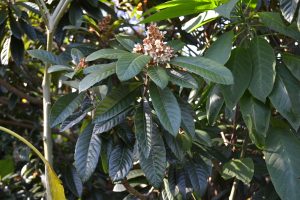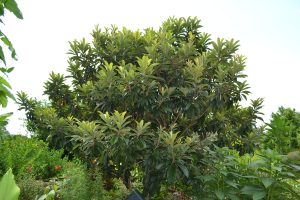Although not native to Florida, the Loquat or Japanese plum is adapted to North Florida conditions. Unlike its relatives, apple, peach, and pear, the loquat is an evergreen tree providing a tropical look with attractive dark green leaves.
Flowers appear in Fall and are pollinated by many insects. Orange fruits are ready for harvest in spring if temperatures have not been too cold.

Bees will visit loquat flowers in the fall. Photo by Beth Bolles, UF IFAS Extension Escambia County.
Loquat trees can reach 20 to 25 feet in height with a good spread. Seedling trees will produce fruit but improved flavors are available with different cultivars.
One of the loquats in the Escambia County Demonstration garden was damaged by a hard freeze and succumbed to a secondary bark beetle attack the following spring. The 2nd tree is thriving as a key feature in the tropical garden. The downside to the location of our tree is that is surrounded by informal walkways that can get messy from fruit that falls in the spring. This may be a consideration when you install your own loquat tree.
- Gifts from the Garden - January 15, 2026
- A Plant From My Past - January 8, 2026
- Garden Spider Egg Sacs - October 23, 2025

